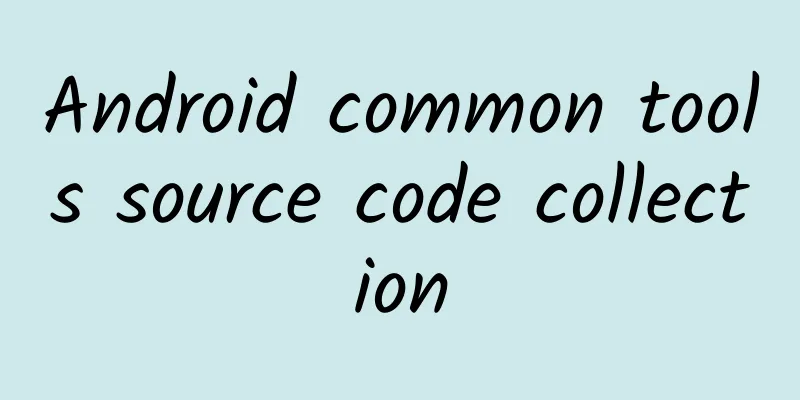Android common tools source code collection

|
This article mainly introduces and summarizes the commonly used tool classes in Android development, most of which are also applicable to Java. Currently, they include HttpUtils, DownloadManagerPro, ShellUtils, PackageUtils, PreferencesUtils, JSONUtils, FileUtils, ResourceUtils, StringUtils, ParcelUtils, RandomUtils, ArrayUtils, ImageUtils, ListUtils, MapUtils, ObjectUtils, SerializeUtils, SystemUtils, and TimeUtils. The English version of this article see: Android Common Utils All codes are in TrineaAndroidCommon@Github, welcome to Star or Fork^_*, in addition to these tool classes, this project also includes cache, drop-down ListView, etc. Detailed interface introduction can be seen in TrineaAndroidCommon API Guide. Specific use: You can directly introduce TrineaAndroidCommon as the library of your project (how to pull code and add public libraries), or extract some of them for use. 1. HttpUtilsHttp network tool class, mainly including httpGet, httpPost and http parameter related methods, taking httpGet as an example: static HttpResponse httpGet(HttpRequest request) static HttpResponse httpGet(java.lang.String httpUrl) static String httpGetString(String httpUrl) Contains the above three methods, uses gzip compression by default, and uses bufferedReader to increase reading speed. In HttpRequest, you can set other http parameters such as url, timeout, userAgent, etc. HttpResponse can obtain the return content, http response code, http expiration time (max-age and expires of Cache-Control), etc. The first two methods can perform advanced parameter settings and return rich content, and the third method can simply pass in a URL to get the return content, which is similar to httpPost. For more detailed settings, you can directly use HttpURLConnection or Apache's HttpClient. The source code can be found in HttpUtils.java. For more methods and detailed parameter descriptions, see HttpUtils Api Guide. 2. DownloadManagerProAndroid system download manager DownloadManager enhanced method can be used to obtain download related information, such as: getStatusById(long) Get download status getDownloadBytes(long) Get download progress information getBytesAndStatus(long) Get download progress information and status getFileName(long) Get the download file path getUri(long) Get download uri getReason(long) Get the reason why the download failed or was paused getPausedReason(long) Get the reason why the download was paused getErrorCode(long) Get the download error code For the source code, see DownloadManagerPro.java. For more methods and detailed parameter descriptions, see DownloadManagerPro Api Guide. For the use of Android DownManager, see DownManager Demo. 3. ShellUtilsAndroid Shell tool class, which can be used to check the system root permissions and execute shell commands under the shell or root user. For example: checkRootPermission() Check root permission execCommand(String[] commands, boolean isRoot, boolean isNeedResultMsg) Executes commands in the shell environment. The second parameter indicates whether it is executed with root privileges. execCommand(String command, boolean isRoot) executes commands in shell environment The source code can be found in ShellUtils.java. For more methods and detailed parameter descriptions, see ShellUtils Api Guide. For silent installation, see apk-root permission silent installation. 4. PackageUtilsAndroid package related tool class, which can be used to install applications (root), uninstall applications (root), determine whether it is a system application, etc., such as: install(Context, String) Install the application. If it is a system application or rooted, it will be installed silently, otherwise it will be installed normally. uninstall(Context, String) Uninstall the application. If it is a system application or rooted, it will be uninstalled silently, otherwise it will be uninstalled normally. isSystemApplication(Context, String) Determines whether the application is a system application For source code, see PackageUtils.java. For more methods and detailed parameter descriptions, see ShellUtils Api Guide. For silent installation, see apk-root permission silent installation. 5. PreferencesUtilsAndroid SharedPreferences related tool classes can be used to easily read and write related types of data to SharedPreferences, such as: putString(Context, String, String) saves string type data putInt(Context, String, int) saves int type data getString(Context, String) Get string type data getInt(Context, String) Get int type data You can modify the preference name by modifying the PREFERENCE_NAME variable The source code can be found in PreferencesUtils.java. For more methods and detailed parameter descriptions, see PreferencesUtils Api Guide. 6. JSONUtilsThe JSONUtils tool class can be used to easily read and write related types of data to Json, such as: String getString(JSONObject jsonObject, String key, String defaultValue) gets string type value String getString(String jsonData, String key, String defaultValue) Get string type value Indicates reading the value of a String type key from json getMap(JSONObject jsonObject, String key) get map getMap(String jsonData, String key) get map Indicates reading the value of a Map type key from json The source code can be found in JSONUtils.java. For more methods and detailed parameter descriptions, see JSONUtils Api Guide. 7. FileUtilsFile tool class, which can be used to read and write files and operate on files. For example: readFile(String filePath) Read file writeFile(String filePath, String content, boolean append) write file getFileSize(String path) Get the file size deleteFile(String path) Delete file The source code can be found in FileUtils.java. For more methods and detailed parameter descriptions, see FileUtils Api Guide. 8. ResourceUtilsAndroid Resource tool class can be used to read content from the raw and assets directories of the Android resource directory, such as: geFileFromAssets(Context context, String fileName) Get the contents of a file in the assets directory geFileFromRaw(Context context, int resId) Get the content of a file in the raw directory The source code can be found in ResourceUtils.java. For more methods and detailed parameter descriptions, see ResourceUtils Api Guide. 9. StringUtilsString tool class, which can be used for common string operations, such as: isEmpty(String str) Determines whether the string is empty or has a length of 0 isBlank(String str) Determines whether the string is empty or has a length of 0 or consists of spaces utf8Encode(String str) Encode in utf-8 format capitalizeFirstLetter(String str) capitalize the first letter The source code can be found in StringUtils.java. For more methods and detailed parameter descriptions, see StringUtils Api Guide. 10. ParcelUtilsAndroid Parcel utility class, which can be used to read or write special types of data from parcel, such as: readBoolean(Parcel in) Reads Boolean data from parcel readHashMap(Parcel in, ClassLoader loader) Reads map type data from pacel writeBoolean(boolean b, Parcel out) Writes boolean data to parcel writeHashMap(Map<K, V> map, Parcel out, int flags) Writes map type data to parcel The source code can be found in ParcelUtils.java. For more methods and detailed parameter descriptions, see ParcelUtils Api Guide. 11. RandomUtilsRandom number tool class, which can be used to obtain random numbers within fixed size and fixed characters, such as: getRandom(char[] sourceChar, int length) Generates a random string, all characters are within a string getRandomNumbers(int length) Generates random numbers The source code can be found in RandomUtils.java. For more methods and detailed parameter descriptions, see RandomUtils Api Guide. 12. ArrayUtilsArray tool class, which can be used for common array operations, such as: isEmpty(V[] sourceArray) Determines whether the array is empty or has a length of 0 getLast(V[] sourceArray, V value, V defaultValue, boolean isCircle) Gets the previous element of an element in the array. isCircle indicates whether it is circular. getNext(V[] sourceArray, V value, V defaultValue, boolean isCircle) Gets the next element of an element in the array. isCircle indicates whether it is circular. The source code can be found in ArrayUtils.java. For more methods and detailed parameter descriptions, see ArrayUtils Api Guide. 13. ImageUtilsImage tool class, which can be used to convert between Bitmap, byte array, Drawable and scale images. Currently, its functions are weak and will be enhanced later. For example: bitmapToDrawable(Bitmap b) bimap converted to drawable drawableToBitmap(Drawable d) Converts a drawable to a bitmap drawableToByte(Drawable d) Drawable converted to byte scaleImage(Bitmap org, float scaleWidth, float scaleHeight) Scale image The source code can be found in ImageUtils.java. For more methods and detailed parameter descriptions, see ImageUtils Api Guide. 14. ListUtilsList tool class, which can be used for common List operations, such as: isEmpty(List<V> sourceList) Determines whether the List is empty or has a length of 0 join(List<String> list, String separator) List is converted to a string and split by a fixed separator addDistinctEntry(List<V> sourceList, V entry) Adds unique elements to the list The source code can be found in ListUtils.java. For more methods and detailed parameter descriptions, see ListUtils Api Guide. 15. MapUtilsMap tool class, which can be used for common Map operations, such as: isEmpty(Map<K, V> sourceMap) Determines whether the map is empty or has a length of 0 parseKeyAndValueToMap(String source, String keyAndValueSeparator, String keyAndValuePairSeparator, boolean ignoreSpace) String is parsed into map toJson(Map<String, String> map) map is converted to json format The source code can be found in MapUtils.java. For more methods and detailed parameter descriptions, see MapUtils Api Guide. 16. ObjectUtilsObject tool class, which can be used for common operations on Object, such as: isEquals(Object actual, Object expected) Compares whether two objects are equal compare(V v1, V v2) compares the size of two objects transformIntArray(int[] source) Integer array converted to int array The source code can be found in ObjectUtils.java. For more methods and detailed parameter descriptions, see ObjectUtils Api Guide. 17. SerializeUtilsSerialization tool class, which can be used to serialize objects to files or deserialize objects from files, such as: deserialization(String filePath) Deserialize an object from a file serialization(String filePath, Object obj) Serializes the object to a file The source code can be found in SerializeUtils.java. For more methods and detailed parameter descriptions, see SerializeUtils Api Guide. 18. SystemUtilsSystem information tool class, which can be used to get the appropriate size of the thread pool. It is weak at present and will be enhanced later. For example: getDefaultThreadPoolSize() Gets the thread pool size that matches the system configuration The source code can be found in SystemUtils.java. For more methods and detailed parameter descriptions, see SystemUtils Api Guide. 19. TimeUtilsTime tool class, which can be used for time-related operations, such as: getCurrentTimeInLong() Get the current time getTime(long timeInMillis, SimpleDateFormat dateFormat) Converts long to a fixed-format time string The source code can be found in TimeUtils.java. For more methods and detailed parameter descriptions, see TimeUtils Api Guide. |
<<: Mail Master Pro is coming to iOS for free this week
>>: Creating a Material Design Android App: Creating Lists and Cards
Recommend
What special tricks do creatures living in cold areas have?
★ Short-term quick freezing will freeze animals s...
Google Play opens developer team in China
[[132708]] Chris Yerga, vice president of enginee...
Is it true that the "first aurora appeared in Chongqing" is true? A starry sky photographer is here to answer the question!
On August 14, a photographer posted a photo of an...
How to build an app growth plan? 5 steps!
User growth is a complex system that involves the...
Faurecia to build third plant in Morocco to produce interior and emission control parts
According to foreign media reports, French automo...
Don’t know how to promote events? Here is a set of event operation templates!
Written in front: The protagonist of this templat...
There are only a few habits between you and the big guns of operations
It is basically a consensus among everyone that o...
iOS 18 has been updated again, bringing many new features!
This morning, Apple pushed out iOS 18 Beta 3, two...
99% of people don't know! What are the little black dots on the car windows used for?
People who often ride or drive You may find a sma...
Is Apple really using the USB-C interface to make money by selling accessories?
Apple's full deployment of USB-C interfaces on...
I'm already full, so why can't I control my mouth?
There are two things that are difficult for human...
The secrets of Douyin App's operation and promotion routines
The reason why Douyin is so popular is not only b...
The entire process of account building and optimization, a must-read for investment!
The construction of an account is like a pyramid,...
How important is deliberate practice? Brain: If you repeat something 10,000 times, you will become an expert in that field!
□ Wang Mingyu In daily life, we often hear the ph...
How to use information flow advertising to increase APP downloads?
How to use information flow advertising to increa...









